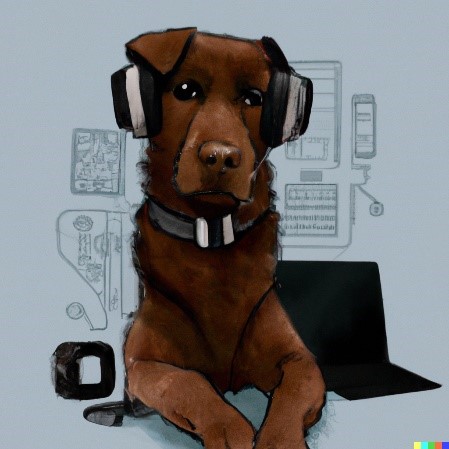Developments in technology are improving communication between the human and animal kingdom in several new and exciting ways. Advancements range from using AI to decode the sonar sounds of sperm whales, to enabling dogs to ask humans for help, and vice versa. The applications of these new technologies are wide-ranging and may have profound effects on the way we interact with other species.
Technology which allowed us to detect sonic communication opened our ears to a new and fascinating world. We began to find that animals we never knew communicated had a complex and unique language of their own. The combination of sonic detection and pattern recognition technology such as AI may eventually allow us to achieve rudimentary interspecies communication. Yet, we are still far off from being able to have complex conversations with our favorite animals. Especially given the added challenge that not all communication is auditory with visual and biochemical elements involved in some species’ communication.
An area which has already seen significant developments is the creation of products to help service dogs assist their handlers. The FIDO project (Facilitating Interactions for Dogs with Occupations) founded by Dr. Melody M. Jackson has made leaps and bounds. The focus is on improving communication not just between the dogs and their handlers, but to also enable the dogs to communicate on behalf of their handlers where they cannot do so themselves.
Trained service dogs already have ways of communicating certain information to their owners such as a hearing dog guiding a handler to a sound or a bomb detection dog guiding specialists to the bomb. However, Dr. Jackson emphasizes that allowing a dog to provide more specific information, such as identifying a specific sound as a fire alarm or smelling the difference between bombs with differing danger levels, could save many lives.
The FIDO project has also envisioned devices which would allow search and rescue dogs to activate a geo-location sensor rather than having to run between the handler and target as they currently do. As well as a device that sends an auditory warning to nearby individuals when the dog detects their owner is about to be put in danger due to occurrences such as a seizure or a drop in pressure levels.
The dogs can alert their handlers by using sensors which specialize in functions that a dog innately does well, such as wearable devices with a sensor or tug function. Dogs are also being trained to operate an infrared ‘touch screen’ where they communicate through different colored circles. Additionally, the FIDO project is even developing dog harnesses which use vibrators in different areas to communicate with the dog where actions or verbal communication is not possible.
Some studies praise the development of technologies that improve the relationship between support animals and their owners rather than replacing it with other forms of technologies, such as smart homes for example. They emphasize the many roles and importance of the animals, which cannot be entirely replaced by other forms of technology.
Given the importance we place on not just service dogs but on our pets in general it is no surprise that just as humans are increasingly monitoring their health through biometric devices, so too is the investment in the animal equivalent skyrocketing.
Factors attributed to this growth include increasing adoption of digital technologies, greater prevalence of chronic diseases affecting animals and the need to maintain the health of companion animals.
Technology is certainly helping to bridge long-standing barriers between humans and other species. How much of an impact it will have on our relationship with animals, one cannot know. But if one thing is clear it is that there are certain some exciting developments taking place which we can admire and wonder how they will shape our future.
smartR AI has its very own loyal dog, SCOTi® AI. SCOTi comes to work with you every day, not just on ‘pets allowed’ days! It’s a powerful business AI virtual agent designed to address your specific business needs − it is simply superior, and is your best friend. Contact smartR AI to find out more about private AI solutions.
Written by Celene Sandiford, smartR AI

